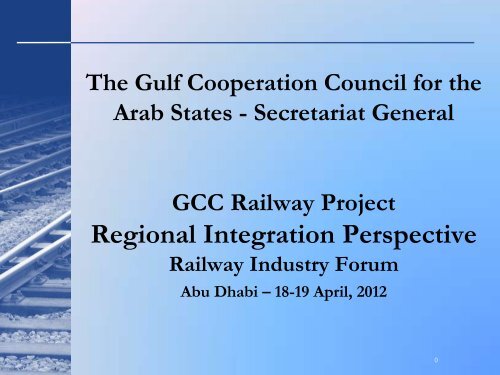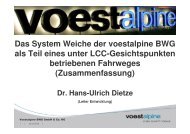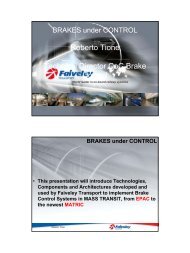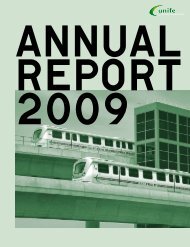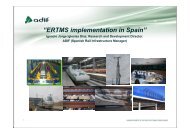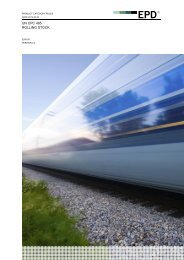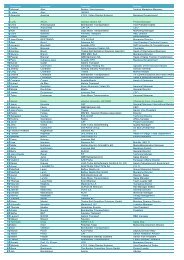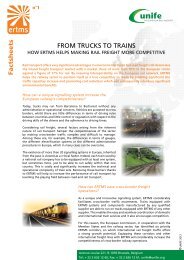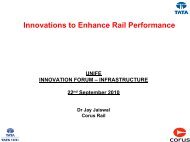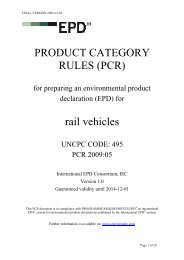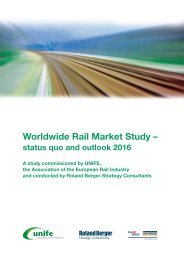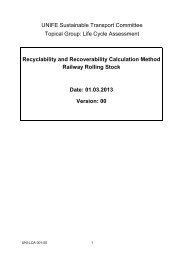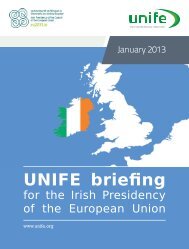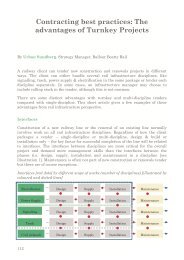Efforts of GCC countries to ensure interoperability along ... - Unife
Efforts of GCC countries to ensure interoperability along ... - Unife
Efforts of GCC countries to ensure interoperability along ... - Unife
You also want an ePaper? Increase the reach of your titles
YUMPU automatically turns print PDFs into web optimized ePapers that Google loves.
The Gulf Cooperation Council for the<br />
Arab States - Secretariat General<br />
<strong>GCC</strong> Railway Project<br />
Regional Integration Perspective<br />
Railway Industry Forum<br />
Abu Dhabi – 18-19 April, 2012<br />
0
Topics<br />
‣ <strong>GCC</strong> Railway Project - Status<br />
‣ A Regional Integration<br />
Perspective<br />
‣ Project Implementation –<br />
Next Phases<br />
‣ Key Challenges and<br />
Opportunities<br />
‣ Lessons Learned – Way<br />
Forward<br />
‣ <strong>GCC</strong> Railway Extension <strong>to</strong><br />
Yemen<br />
1
<strong>GCC</strong> Railway Project - Status<br />
‣ Feasibility study concluded 2009. Endorsed by <strong>GCC</strong><br />
30 th Summit (December 2009).<br />
‣ Project is Economically and Financially feasible:<br />
– (<strong>GCC</strong> MS Governments pay infrastructure capital costs<br />
based on railway length in each MS).<br />
‣ Concession Operations & maintenance <strong>to</strong> Private<br />
Sec<strong>to</strong>r.<br />
‣ Railway links <strong>GCC</strong> MS – Kuwait <strong>to</strong> Muscat with a<br />
Proposed New Causeway between Saudi Arabia and<br />
Kingdom <strong>of</strong> Bahrain.<br />
‣ Total length estimated 2177 km single track mix use –<br />
passenger and freight transport.<br />
2
<strong>GCC</strong> Railway Project - Status<br />
‣ Total capital cost estimated:<br />
– US$15.5 billion (200 km/hr –Diesel Traction).<br />
– US$25.6 billion (350 km/hr –Electric Traction).<br />
‣ Project expected <strong>to</strong> be operational about 2017.<br />
‣ Project will:<br />
– Generate significant employment for <strong>GCC</strong> Nationals.<br />
– Promote social integration & economic development &<br />
growth.<br />
– Advance <strong>GCC</strong> –SG Initiatives on Common Market and<br />
Cus<strong>to</strong>m Union & Trade Facilitation.<br />
– Support building national railway industries in the <strong>GCC</strong> MS.<br />
– Alleviate congestion and reduce maintenance costs on road.<br />
– Add valuable and integrated mode <strong>of</strong> transport.<br />
3
<strong>GCC</strong> Railway Feasibility Alignment<br />
<strong>GCC</strong> Railway<br />
Feasibility Alignment<br />
4
Project Implementation – Next Phases<br />
‣<strong>GCC</strong> MS are well advanced in developing<br />
the Detailed Engineering Designs –<br />
Expected <strong>to</strong> be Completed by 2012.<br />
‣Construction is expected <strong>to</strong> commence by<br />
<strong>GCC</strong> Member States (MS) about 2013/2014<br />
and completed by about 2017.<br />
‣A “<strong>GCC</strong> Railway Authority” is expected <strong>to</strong><br />
be formed <strong>to</strong> oversee the overall<br />
implementation <strong>of</strong> the project and<br />
coordinate and organize with <strong>GCC</strong> MS.<br />
5
Project Implementation – Meeting Needs<br />
‣<strong>GCC</strong> MS formed a Steering Committee<br />
(Financial and Technical) <strong>to</strong> coordinate with<br />
the <strong>GCC</strong>-SG <strong>to</strong> oversee the Implementation <strong>of</strong><br />
the <strong>GCC</strong> Railway.<br />
‣Several <strong>GCC</strong> MS have signed contracts for the<br />
design and construction <strong>of</strong> the National<br />
Railway and Metro Plans including the <strong>GCC</strong><br />
Railway project.<br />
‣<strong>GCC</strong>-SG Transport Department is<br />
strengthening its capacity forming a PMU<br />
staffed with skills required <strong>to</strong> implement the<br />
<strong>GCC</strong> Railway project.<br />
6
Project Implementation – Meeting Needs<br />
‣<strong>GCC</strong>-SG continues <strong>to</strong> be the focal point for the<br />
overall organization and communications with<br />
the <strong>GCC</strong> MS on the implementation <strong>of</strong> the <strong>GCC</strong><br />
Railway.<br />
‣<strong>GCC</strong> MS established Railway Companies<br />
and/or Authorities <strong>to</strong> implement the <strong>GCC</strong><br />
Railway and National Railway Plans.<br />
‣Agreement with World Bank for continued<br />
Advisory Services in the Railway/Transport<br />
Sec<strong>to</strong>r.<br />
7
4 Key Challenges - Opportunities<br />
1. Technical:<br />
‣ Finalize the alignment cross Boarders linkage<br />
Points.<br />
‣ Use <strong>of</strong> Common Standards and Specifications.<br />
‣ Interoperability and regional integration <strong>of</strong> the<br />
<strong>GCC</strong> railway.<br />
‣ Design and Construction – Packaging and<br />
Implementations schedule(s).<br />
2. Means <strong>of</strong> Procurements:<br />
‣ Packaging for Design, Construction, &<br />
Operation.<br />
‣ Prepare Bidding Documents for Concession &<br />
transactions (Need Appoint T/F/L Advisors).<br />
‣ Optimize Completed Detailed Engineering<br />
Design.<br />
8
Key Challenges and Opportunities<br />
3. Enabling Environment:<br />
‣ Setting up Adequate Institutional Framework:<br />
• Private Sec<strong>to</strong>r Participation in Railway Development.<br />
• Need for Institutional Capacity Building.<br />
‣ Efficient Coordination (SRO, SAR, NTA, Etihad<br />
Rail, Qatar Rail, Kuwait Transport Company, etc.).<br />
‣ Enabling Policy, Strategy & Regulations.<br />
‣ Set-up Economic & Safety Regula<strong>to</strong>ry Authority.<br />
4. Government’s Financial Liability:<br />
‣ Cost <strong>of</strong> Railway- Capital & Rolling S<strong>to</strong>ck.<br />
<strong>GCC</strong> MS Cost Sharing.<br />
Determine Government Subsidy, if any.<br />
‣ Cost <strong>of</strong> Building Extension Lines.<br />
‣ Cost <strong>of</strong> introduction <strong>of</strong> high speed passenger<br />
Services.<br />
9
Lessons Learned – Way Forward<br />
‣Need <strong>to</strong> stream line the decision making<br />
process amongst <strong>GCC</strong>-MS and <strong>GCC</strong>-SG.<br />
‣Need more stringent procurement guidelines<br />
<strong>to</strong> <strong>ensure</strong> selection <strong>of</strong> required skills and<br />
quality consultants/contrac<strong>to</strong>rs.<br />
‣Need for a strategic <strong>GCC</strong> transport sec<strong>to</strong>r<br />
review and assessment focusing on regional<br />
networks integration – a transport logistics<br />
perspective.<br />
‣Meeting/understanding <strong>GCC</strong> National<br />
Environments while adopting International<br />
best practices.<br />
10
<strong>GCC</strong> Railway Link <strong>to</strong> Yemen<br />
‣<strong>GCC</strong> SG has completed a feasibility study <strong>to</strong><br />
link the <strong>GCC</strong> Railway <strong>to</strong> Yemen border.<br />
11


